The improbable relationship between Turkey and Israel has long stood as a unique model of pragmatic, strategic thinking in a region rife with instability, tension, and identity-based alliances. In recent months, however, growing strains between the Jewish state and its Muslim neighbor have come to light, leading some to believe their decades-old ties could reach the breaking point. And yet, if one looks more closely at the relationship, it is hard to avoid the conclusion that a break between the two countries is highly unlikely. To be sure, relations between Israel and Turkey underwent a shift in tone after the […]
Middle East & North Africa Archive
Free Newsletter
Greg Scoblete wonders whether the Taliban’s new YouTube channel represents an attempt by the group to widen its appeal, and calls the question “disturbing.” I’d actually find it reassuring, if that’s the intention. Radical groups remain radical precisely because they value ideological “purity” over wide appeal. It’s when they attempt to widen their appeal that they are forced to confront the reality of how limited a constituency there is for their radical agendas. And actually being answerable to a wider constituency only reinforces that process. The reason Hezbollah has been deterred by the 2006 Lebanon War is not because of […]
Not all of it is the result of armed intervention. Two pillars of stability in the region, Egypt and Saudi Arabia, are on the verge of a potentially generational change in leadership, and of course the result is alarmism. In some ways I take a contrarian view of the Middle East: It’s neither as important nor as “on the brink” as it’s consistently portrayed. There’s a sometimes abrupt and sometimes gradual ebb and flow between violence and enmity on the one hand and hard-nosed realism and treachery on the other, all of which makes for a much more fluid strategic […]
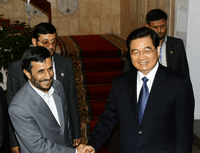
On Iran, China increasingly seems to be the odd man out. Not only have the French taken a surprisingly hard line in international efforts to regulate the Iranian nuclear program, but there are signs that Russia may be stiffening its resolve as well. China, by contrast, seems invariably to caution patience. Meanwhile, Chinese firms are expanding into the Iranian market at the same time that many international actors are leaving. There was a time not so long ago when China would have been expected to undermine Western policy. In the 1960s and 1970s, the People’s Republic worked to chip away […]
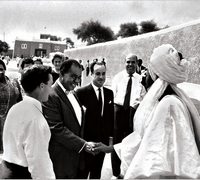
Over time we have come to realize that culture is the obstacle, and that culture is the best way to change culture. — Alyse Nelson, President, Vital Voices The word “culture” conveys multiple meanings. Alyse Nelson, president of the non-governmental organization Vital Voices, which promotes women’s empowerment globally, notes that “culture” in the anthropological sense is often evoked as a rationale for limiting women’s roles in society, while “culture,” meaning creative expression, can present a vision of an attractive alternative lifestyle or solution that can break the stranglehold of tradition. When Vital Voices works with local partners in different parts […]

Editor’s note: The following article is one of 30 that we’ve selected from our archives to celebrate World Politics Review’s 15th anniversary. You can find the full collection here. On Sept. 1, 2009, the new U.S. Ambassador to Kenya Michael E. Ranneberger, a career foreign service officer with deep experience on the African continent, started a Twitter feed. The seven or so tweets he posted between then and Sept. 29 were lauded as another example of "Twitter Diplomacy." Shashank Bengali, blogging for McClatchy, declared that the ambassador came out "swinging" with highly charged comments about Kenyan presidential appointees and in support […]
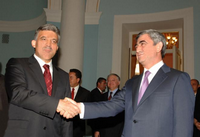
ISTANBUL, Turkey — Yesterday’s signing of protocols by Turkey and Armenia that pave the way for restoring relations between the two countries was, without a doubt, a historic moment. But it’s still too early to break out the champagne. The protocols — signed in Zurich in the presence of the American, French and Russian foreign ministers — spell out in the clearest terms to date what needs to happen in order for diplomatic ties to be restored and for the two countries’ borders to be reopened. But significant hurdles, some of which involve actors outside of Turkey and Armenia themselves, […]
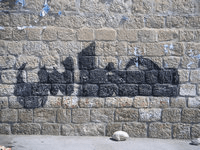
RAMALLAH, West Bank — On most days, Ramallah bustles with the sounds of commerce typical of Middle Eastern towns. The city, seat of power for the Palestinian Authority, is experiencing an economic boom that looks deceptively like normalcy. Pedestrians move along crowded sidewalks while traffic crawls along in the city center. In newer parts of town, bright new buildings give the city an air of prosperity reminiscent of the wealthiest areas of Jerusalem or Amman, the Jordanian capital. Underneath the visible progress, however, signs are growing that the months ahead could bring heightened tension and even violence in the Palestinian […]
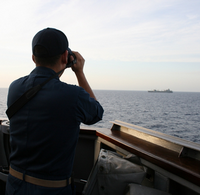
ABOARD USS DONALD COOK — It was a rare moment of excitement on a long, tedious counter-piracy patrol. On the evening of Sept. 24, lookouts on the USS Donald Cook, a Virginia-based destroyer assigned to a NATO flotilla in the Gulf of Aden, spotted a mysterious shape on the horizon. The distant vessel did not respond to Donald Cook’s hails as it loomed closer. With the cry, “Ship of interest,” crew members summoned Donald Cook’s captain, Derek Granger. Interrupted during a rare bit of down-time, Granger climbed to the bridge wearing shorts and a t-shirt. Lighting his customary cigar, he […]
I noticed that Stephen Walt’s post questioning the risk of a nuclear or near-nuclear Iran setting off a regional nuclear arms race in the Middle East was long on nonproliferation theory and non-regional historical examples. But there wasn’t much discussion of the political dynamics specific to the Middle East that would certainly play a role in such a scenario. For that I recommend this U.S. Senate Foreign Relations Committee report (.pdf) examining the factors driving Saudi, Egyptian and Turkish policy on this very question. Although it expresses no certainty, the report’s outlook is a bit less sanguine than Walt’s discussion. […]
Among the consequences of a military strike against Iran’s nuclear program, we often hear about Iran’s fearsome response capacity, which at its most potent include its proxies (Hezbollah, Hamas and militia cells in Iraq and potentially Afghanistan); its long-range missiles (capable of reaching Israel); its asymmetric and irregular assets abroad (think terrorist attacks); and the ability to close the Strait of Hormuz to oil shipping. Sam Roggeveen was the first person I remember who directly challenged a number of these assumptions. Eugene Gholz recently expressed skepticism about the oil transport angle. Now Robert Farley builds on a post by Galrann […]
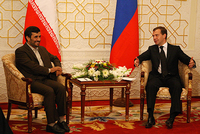
At their Oct. 1 meeting in Geneva, representatives from Iran and the P5+1 (the five permanent U.N. Security Council members plus Germany) appeared to make considerable progress. The Iranian government representative agreed to allow the International Atomic Energy Agency (IAEA) to inspect its recently revealed second, secret uranium enrichment facility near the city of Qum. Iran also expressed interest “in principle” in sending its stockpiles of low enriched uranium to Russia and France for further enrichment and conversion into fuel rods for an experimental reactor used for medical purposes. Russia’s role in helping secure these developments remains unclear. Russian leaders […]

The outcome of talks to discuss the Iranian nuclear crisis on Oct. 1 between representative of the P5+1 and Iran appears to be more positive than had been anticipated. However, the reality is that the basic positions of all sides remain unchanged. In its previous attempts to solve this slow-burning crisis, the West has repeatedly failed to understand the intentions and strategies of the Iranian government. This has allowed Tehran to buy time for its uranium enrichment program and for the ongoing construction of a heavy-water reactor at Arak. The West’s focus on the enrichment issue has obscured the ways […]
I admit to being pleasantly surprised when I saw the initial reports on the outcome of yesterday’s talks on the Iran nuclear program. To be sure, this is not a sufficient step to any stable resolution of the conflict. But it was a necessary one, in that any further progress would have been impossible without first passing through this gate. One thing to keep in mind, though, to understand why yesterday’s outcome avoided the worst and does not guarantee future success, is that this was a so-far-isolated instance in this ongoing standoff where a positive outcome was in everyone’s interests. […]
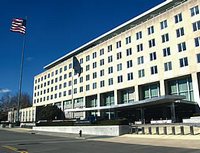
Not long after the so-called “civilian surge” was announced as part of the troop buildup in Afghanistan, a veteran State Department foreign service officer I spoke with posed a simple question: “Where are they going to come from?” He had recently returned from a year serving on a Provincial Reconstruction Team in Afghanistan and was grappling with the lack of civilian expertise that he said was so desperately needed for the state-building tasks there. “Is the new Secretary of Agriculture going to volunteer staff? The Secretary of the Treasury?” He suspected not. The diplomat’s insights get at a central challenge […]

Despite the encouraging outcome of yesterday’s talks in Geneva, the nuclear standoff with Iran is far from over. It will not end for the U.S. until there is full, ongoing compliance with all protocols of the Nuclear Nonproliferation Treaty (NPT) and the International Atomic Energy Agency’s (IAEA) inspection regime. And so long as Mahmoud Ahmadinejad is Iran’s president, it very likely will not end for Iran until breakout capability has been achieved. It should not be surprising that yesterday in Geneva, Ahmadinejad’s recalcitrant regime appeared to make major concessions to the permanent members of the U.N. Security Council and Germany […]
U.S. President Barack Obama spoke from the White House at theconclusion of talks in Geneva between diplomats from the United States,the United Kingdom, France Russia, China, Germany and Iran. “TheIranian government heard a clear and unified message from theinternational community in Geneva: Iran must generate through concretesteps that it will live up to its responsibilities with regard to itsnuclear program. In pursuit of that goal, today’s meeting was aconstructive beginning, but it must be followed with constructiveaction by the Iranian government,” Obama said.
